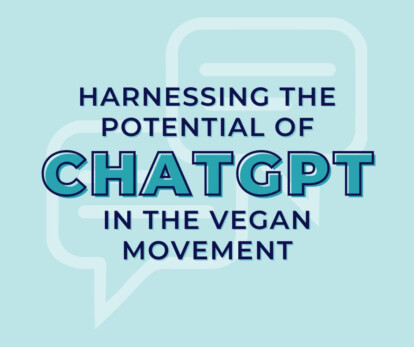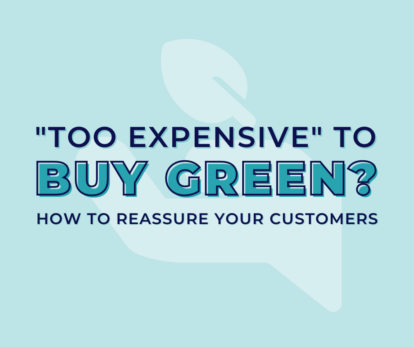Using ChatGPT in the vegan movement: Navigating risks and maximising benefits


As you probably know only too well as someone who runs an ethically-focused organisation, one of the biggest barriers to reaching new customers is the perception that it’s too expensive to buy green.
Many people want to shop more ethically and support products and services that are good for the planet but with the cost of living on the up and the legacy of COVID on health and jobs, some are wondering whether they can afford to shop with a conscience.
In today’s blog, we’re taking a closer look at how you can show your customers that it doesn’t always cost more to buy green.
The Global Sustainability Study 2021 surveyed 10,000 people across 17 countries to assess their attitudes toward sustainability. The biggest takeaways of the study were that:
So, what does that mean for your business or organisation?
It’s clear that there’s an ever-increasing audience for sustainable products and services. While many people are having to tighten their belts, they also recognise that the ecological crisis is happening and that we have to change our behaviour as consumers.
One-third of the people interviewed for The Global Sustainability Study said that they would be willing to pay a premium for sustainable products and that all companies should prepare for sustainability to become an expectation rather than a “nice-to-have”.
The fact that you already have a sustainability-focused business means that you’re ahead of the crowd.
No, and yes (sometimes).
The reality is that sustainable products and services are often more expensive than their non-sustainable counterparts. As you know, there are many reasons for this. Things aren’t made in bulk, materials are ethically sourced and produced (which takes time), workers are paid higher wages, etc. The list goes on.
Although people understand these issues to some degree, you probably won’t want to draw attention to the price point being higher – certainly not as a key selling point!
That being said, sustainable products are usually more cost-effective for shoppers in the long term and this could be woven into your messaging.
Take the humble coffee cup…
In Britain alone, people drink around 95 million cups of coffee per day (an average of two cups per coffee fan). This passion for coffee sees Brits disposing of 2.5 billion plastic-coated takeaway coffee cups every single year. Only one in 400 cups is recycled.
In an effort to counter this, many coffee shops now offer a discount to shoppers who request a brew in their own reusable cup. If an average reusable coffee cup costs £10 and you can get as much as a 50p discount on each purchase, you only have to drink 20 cups to have recouped the cost of the reusable cup. Even at one cup a day, that’s less than three weeks to make up for the initial outlay, after which every drink bought represents a 50p saving as well as being better for the planet.
If you do decide to highlight the price, focus on how much money the customer will save.
Price often comes much further down the list of considerations than we might think. If you recall the stats from The Global Sustainability Study, 33% of people will pay more for sustainable products.
Why? Because they care about contributing to a better future for the planet and it feels great to do the right thing.
One of the most powerful things you can do in your marketing is to focus on what makes people feel good when they buy your ethical products. Too often, businesses place the emphasis on making people feel guilty for buying or doing something unethical but this can actually make shoppers more resistant to a sustainable switch. The last thing you want is for potential customers to feel like they’re being judged!
Instead, tell the story of your products and services. Show potential customers how their purchase will make a difference. Talk about who makes your products and what matters to them or explain how what you sell protects our animal kin. Even better, we know that some of our Ethical Globe members have in situ photos and videos on their websites showing the people and processes behind the sourcing of their materials and products. This is a great way of engaging and informing your customers.
The message will depend on your business.
Use your social media pages, blog or newsletter to share clear and tangible information about how your customers make a difference every time they buy from you. This might include sharing:
These are just a few examples but the potential here is huge!
You might want to ask a few customers whether they’d be happy to appear in a “customer spotlight” feature where you look at some of their recent purchases and explain the sustainability story of each one. This is a fantastic way to show people that their individual efforts make a difference.
This is an important point.
As well as worrying that it’s too expensive to buy green, many people question whether they’re actually able to make any difference to the ecological emergency. Telling individual customer stories reinforces the message that even small changes can have a big impact.
Once people recognise this, price becomes less of a priority.
Fairtrade sales increased by 14% in 2020 and 59% of Fairtrade shoppers say they are willing to pay more for a product to ensure that agricultural farmers and workers are paid a fair price.
Research in 2021 backed this up, concluding that “consumers usually react positively to ethical certifications by showing a higher willingness to pay for products with ethical characteristics” and that “the negative effect of price on purchasing intentions of ethical products can be attenuated by focusing on ethical characteristics”.
In other words, if you do have widely-recognised vegan/ethical certification, show it off with pride.
Researchers from the University of Erlangen-Nuremberg and the University of Texas made some surprising observations about how customers perceive business charitable donations.
They noticed that when a business donates a small amount of money to a cause that doesn’t feel relevant to it in any way, customers are reluctant to spend as much as usual on sustainable products. This is because they think the business is exploiting the cause to look good.
If, however, a business donates to a cause that feels connected (for example, a company that sells water in glass bottles donating to a well project), customers will pay more for their purchases.
The biggest takeaway of the research is that when businesses donate a large amount to an unexpected cause, shoppers are willing to pay significantly more. This is because they assume that the cause must be something that genuinely matters (perhaps to someone within the business) and customers want to get behind it.
The same researchers also observed that cause-related marketing sways people more when buying everyday utilitarian products such as toilet paper, compared to when buying so-called “hedonistic” products such as cosmetics, clothes or fragrances.
If you sell everyday items in your business, think about how you might connect this to a charitable cause.
People perceive some green purchases as being riskier. For example, will a refurbished phone last or are remanufactured car engines safe? Although this is a matter of perception and the items will have been returned to the manufacturer’s specifications, you can help to mitigate the sense of risk by offering a discount or having a clear returns policy.
You should also prioritise demonstrating how your business meets or even exceeds environmental recommendations or what you’re doing to address your social responsibility. People are more willing to engage with organisations that are authentic and transparent.
It’s understandable that consumers worry it’s too expensive to buy green. Those of us with an ethical focus can help to change that narrative and highlight the long-term savings of shopping sustainably.
Remember to focus on “why” you created your business or organisation and tell that story. Bring people on a journey with you. Show them how you make sustainability affordable in your own life. Highlight the link between fair prices and fair conditions for workers. Show your audience that they can make a difference.
And one final tip! When people first think about shopping more sustainably, they often imagine making like-for-like swaps. But, as you know, being an ethical consumer isn’t just about what we buy – it’s about what we don’t buy too.
Think about how you can incorporate this message into your marketing. Ideally, your new customers will see that they will save money when shopping sustainably, simply because they’ll be buying less and buying to last when they do make a purchase.